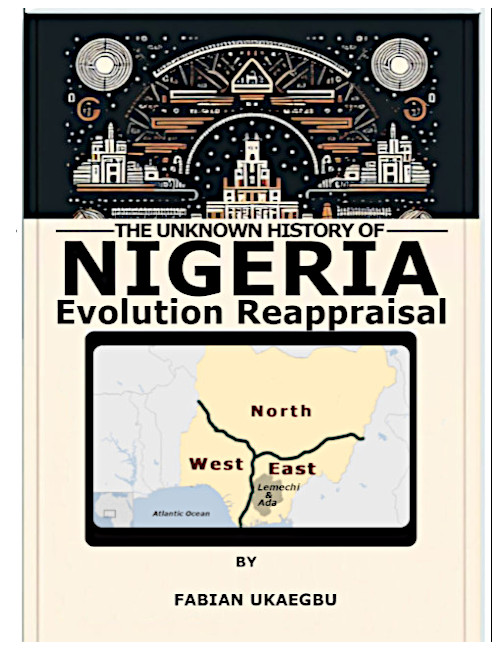The Unknown History of Nigeria: Evolution Reappraisal
The necessity of history is its landmarks. What seemed an oversight was the distraction of the aborigines leaving their roots for spiderwebs - Nigeria. Whoever started trimming the palm tree from its top, will lose its true value. Precisely, how colonialism changed the aborigines’ exacerbated their values; else, the land of origin is there to be known. Eden, the prime nation in the Bible; if ignored, will the values of any other place overshine? I had categorical evidence to pause evolution in the middle to know the blackmail of the Afrikan root. Everyone says it but is unsupported by fact. Here lies the evidence with a known place, father’s and mother’s names, and custom that pacifies evolution. Why did we abandon it for treacherous evolution? If we grow to chase the world without its founding rules, we fool about and condemn everything treasured for us to know to live well. Is it true that we cannot live together?
Today we live in a highly polarized world. History warns us that polarization stretched to the breaking point does not bode well. You can go back centuries before; the only thing that has changed over time is that communication technology makes it all happen faster. Looking at our current positions, the perspectives are that we live in a divided world. Apparently, every nation is fractured; anywhere you look, there are struggles to mend fractured societies. Deep fissures of ethnic, religious, and economic conflict highlight the wrong direction of our evolution. Looking back to the past hundred years in news, media, & policies, I wonder: what can technology, or any institution do to rebuild a sense of relevance, of value, of trust in fact-based knowledge? How might each of us assess our own efforts to address the loss of understanding, the loss of trust, and the loss of a collective sense of the common good?
Firstly, this book resolved the position of Eden. It exhumes the evidence of lived lives. What seemed foolishly challenging were threefold: deviation from custom and radicalization of the world by overpopulation. Wherever any part of the world is in chaos, trace the causes of these issues. When you do, you come back to the nature of humans, which is to be enviously greedy and outrageous; each being self-triggered. Thence, we come to their treatment, which says: that if brethren live together, they inevitably develop traits. Our ancestors coded the traits thus: serpent, tortoise, parrot, spider, chameleon …. All of them are innate, how did they treat them? They treated them covenantly, which is the root of the rule of law of equity and justice. We saw covenants in the Old and New Testaments. (see chapters 1, 2).
In the post-Apostolic era of the NT, we noticed changes after the martyrdoms that altered the covenant to Eucharistia or Communion, which became an unfillable belly. God of covenant safeguards his dealing with covenants. Without covenant, our preferred option promotes things forbidden by covenant which put fire in the world (chapters 4-9). We were not there but they grew to affect us. What razed down the Empires and put fire on the world, where do we find them? All (educationists: religio-politico-socio-philosophers) treated evolution shabbily and mistaking its root/force, their actions fueled more chaos; ponder people coming out from war and entering another war, was it less ominous?
We spent time to identify and address the issues in chapter 10. We saw deviation, confusion, envious rivalry, distortion, and misdirection of evolution. We saw how all teamed up to make life on Earth insatiable. The 138 men that started the human evolution history in 874AE had too much land and resources. Now in the 21st century with 8 billion people, the land and resources have become rarer. Yet, we find ourselves more mixed than before; how best can we achieve good living together mannerism to safeguard the human race? Ponder the Empires that beamed highly but ebbed; thus, mocking human mischief and outrageous approach to the unknown world. We don’t know and should know; will the power that thwarted the abusive Empires to vomit the captives fail to judge the abuses of the freed colonies?
Into the New Era, call it whatever you like (World Order, Market Square, Parliament, Senate, temple/house of…), how can we achieve a good living together mannerism? Before we proceed, we court with samples of the stages of evolution (see p.503), that were skidded without remediation. Is it religion only that divides us? TBE, Jen. 24; Exo.22; Num. 25; Deut. 7; Quran-Surah: 2; 3; 4; 5; …distinguished humans. Chapter 2, Man is man, woman is woman; as Adam said (TBE, Jen. 4:5), with my daughter, I will reach the ends of the earth; is man or woman the issue? Yes, it is their projections; anyhow ignored or twisted, it tasks us to get it right. All the things encoded in us, reflect on us. Now ticking to AD2096 (period of grace) and AD2678 (of judgment), what is our option?
From the trends of evolutions of misgivings (unmanageable populations, corruption, uncertainty, and misunderstanding), the die is cast. However, from custom, and by science championed by Isaac Newton’s laws of motion; if we detest chaos, we pause and remediate. Customarily, we covenant to safeguard our living together. We cannot live together corruptly, enviously, mischievously, hatefully, greedily, or wastefully, and expect a peaceful evolution. Covenant tames and transforms vices into virtues. This is the gate to the New Era, where nothing is assumed or reserved but judged by our choices.
Table Of Content
Preface ============= i
Introduction ============= vii
Chapters:
- 1. The Eden Cradle of Life ---------------- 1
- 2. After God, Man And Woman Is Custom --------- 29
- 3. Pre & Pro-Colonial Era -------- 45
- 4. The Colonial Era ----------------- 106
- 5. Independence And Mishandling of its Fortunes---- 130
- 6. Civil War Impregnations and Diabolisms -------- 158
- 7. Why Did Nigeria Fail? -------- 170
- 8. Does the Reason for Nigeria still exist? ------- 215
- 9. Poat-Civil War Era: A National Review -------- 227
- 10. The Future of Nigeria --------- 245
- 11. The Way Forward --------- 453
- 12. Conclusion -------- 487
- 13. Glossary & index --------- 491

